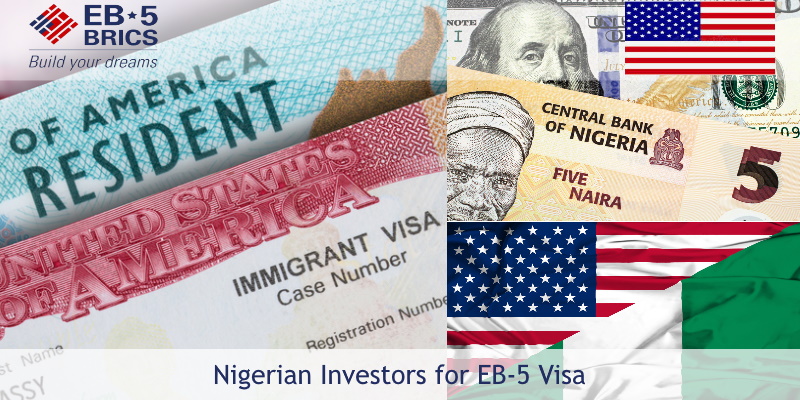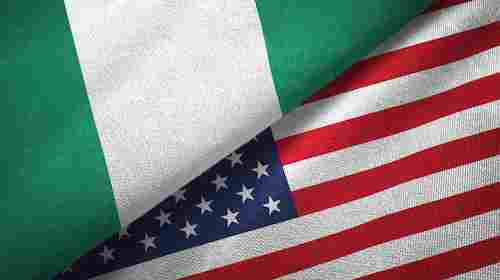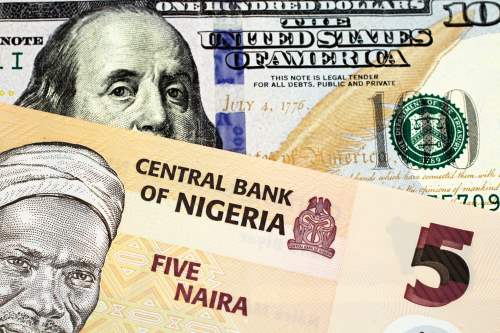
The EB-5 Visa for Nigerian investors is an immigrant visa allowing Nigerian investors and their families to apply for a U.S. green card (permanent residence). A green card (permanent residence) lets Nigerian investors and their families reside in the U.S. permanently. The EB-5 Visa for Nigerian investors has a minimum investment requirement. The investment should generate full-time employment for a minimum of 10 U.S. citizens.
The EB5 Visa for Nigerian investors is in “current” status making it a popular immigration option for Nigerians. Nigeria ranks as the 16th top country with the most EB5 Visa issuances in fiscal year 2023 (0.26% of the total) based on the January 2024 data from the U.S. Department of State.
The EB5 Visa benefits Nigerian investors by enabling them to apply for permanent residence. Global investment opportunities and education in the US are additional driving factors for Nigerian investors applying for the EB-5 Visa.
Table of Contents
What is EB-5 Visa for Nigerian Investors?
The EB-5 Visa for Nigerian investors is an immigrant investor visa that allows for a green card (permanent residence) application. Getting a green card (permanent residence) grants Nigerian investors and their dependents the right to live and work in the U.S. permanently. The eligibility for EB5 Visa for Nigerian investors includes a minimum capital investment and the creation of at least 10 jobs for Americans.
What are the Benefits of EB-5 Visa for Nigerian Investors?
The EB-5 Visa for Nigerian investors has the following benefits for them and their dependents.
- Permanent residence and citizenship in the US. Nigerian investors use the EB5 Visa to qualify for permanent residence in the United States. Nigerian investors can bring their spouses and children under 21 to the US with the EB-5 Visa. A US permanent resident can apply for US citizenship to gain a US passport and the right to vote.
- Investment opportunities. The stability of the US government and the availability of global opportunities attract Nigerian investors to EB5 Visa.
- Better education for children. Nigerian investors hope to send their children to the top universities in the US. Children with green cards can enjoy 150-100% lower tuition fees compared to foreign students who are restricted to in-state US colleges.
- As a permanent resident, your unmarried children under 21 years can do the following.
- Study in some of the best institutions in the world without facing restrictions imposed on foreign students.
- Pay 150% to 300% lower tuition fees as compared to foreign students.
- Enjoy more funding and scholarship options as compared to foreign students.
- Study as a day scholar and avoid long separation from family just to obtain a quality education.
- Explore job opportunities without worrying about issues like work permits, sponsorship, processing delays, expiry of visa, or restrictions on job mobility.
- As a permanent resident, your unmarried children under 21 years can do the following.
- Nigerian investors enjoy greater international mobility through the visa-free travel privileges available to US green cardholders. Nigerian investors with EB-5 Visa have complete freedom to travel and reside anywhere within the US.
What are the Risks of EB-5 Visa for Nigerian Investors?
Nigerian investors should know these risks when applying for the EB-5 Visa.
- Fraud risks. American businessman Marco Ramirez was arraigned in April 2016 for defrauding Nigerian investors out of a $2.3 million EB5 investment scam. Nigerian investors should consult financial experts and extensively research an EB-5 investment project to avoid cases of fraud.
- Investment risks. The EB-5 Visa for Nigerian investors carries a risk of gains and losses. Conducting due diligence to ensure the legitimacy of an EB-5 project will reduce the chances of big losses for Nigerian investors applying for EB5 Visa.
- Immigration risks. Nigerian investors should know the immigration history of the EB-5 project they will invest in. The research should show how many permanent residents and/or loan repayments were successfully issued to EB-5 investors for the same project.
How Long Does it Take to Process an EB 5 Visa for Nigerian Investors?
The Visa Bulletin from the U.S. Department of State (DOS) reflects a “current” status of EB-5 Visa for Nigerian investors. A current status means that there is no backlog (retrogression) in the EB5 Visa for Nigerian investors.
The processing time for the Immigrant Petition by Standalone Investor (Form I-526) for an EB5 Visa for Nigerian investors is between 29.5 to 61 months. The Immigrant Petition by Standalone Investor (Form I-526) is submitted to the United States Citizenship and Immigration Services (USCIS). Form I-526 is the first step to filing an EB5 Visa for Nigerian investors.
The EB-5 U.S. Immigrant Investor Visa Program is available to residents of Nigeria.
What are the Requirements for an EB-5 Visa for Nigerian Investors?

The following are required to qualify for the EB5 Visa for Nigerian investors.
- Investment amount. The “at risk” investment for the EB5 Visa for Nigerian investors can be any of these two.
- The minimum investment is $800,000 (₦342,648,000 Nigerian Naira) for a Targeted Employment Area (region with high unemployment rates and rural areas).
- The investment is $1,050,000 (₦449,725,500 Nigerian Naira) for a non-Targeted Employment Area.
- Source of funds. Nigerian investors can use any of the following to invest.
- Loans from a financial institution or from an individual
- Salaries/wages
- Gifts from an individual
- Inheritance
- Business profits
- Job creation. The EB5 Visa for Nigerian investors requires the creation of 10 full-time American employees.
The financial criteria for the EB-5 Visa for Nigerian investors are the following.
- Net worth of $1,050,000 (₦449,725,500 Nigerian Naira) for an individual or married couple; or
- Minimum of $200,000 (₦85,662,000 Nigerian Naira) in individual income in each of the 2 previous years; or
- Minimum of $300,000 (₦128,493,000 Nigerian Naira) in joint income in each of the 2 previous years; and
- Comparable level of future income and assets
The U.S. Citizenship and Immigration Services (USCIS) allows 10,000 EB-5 visas a year.
Central Bank of Nigeria is the government monetary body that has framework and policy for moving assets and money outside of Nigeria. See their policy here.
Our complete guide on EB5 Visa Requirements has all the information you will need to file your EB-5 petition.
What is the Age Requirement for a Nigerian Investor to Get EB-5 Visa?
There’s no age limit. The meaning of this simply is any Nigerian investor qualifies to be an EB-5 investor. However, since a minor probably does not have the assets or income to be eligible as an EB-5 investor on his own, the parents or some other guardian giving him/her the investment amount requires showing the necessary documents to prove the source of funds. Occasionally, a Nigerian investor pursuing an EB-5 visa will be unable to get specific documentation. In such instances, the applicant may file a declaration giving an explanation as to why they are unable to supply the needed documentation.
The only time age matters is if the parent is applying and children are also part of the application as derivatives. They must be under the age of 21 to be included in a parent’s application.
The EB-5 U.S. The Immigrant Investor Visa Program is available to Nigerian citizens. There is a growing demand for the EB-5 Visa category among Nigerian nationals. If you (or your child) were born in Nigeria, then you can apply for the fast-track Green Card category for the United States through the EB 5 USA Investor Visa Program. See Processing Times for Nigeria
How Much Does an EB-5 Visa Cost for Nigerian Investors?
 These are the basic costs of an EB-5 Visa for Nigerian investors.
These are the basic costs of an EB-5 Visa for Nigerian investors.
- EB-5 investment
- $800,000 (₦342,648,000 Nigerian Naira) for a Targeted Employment Area
- $1,050,000 (₦449,725,500 Nigerian Naira) for a non-Targeted Employment Area
- Form I-526- $3,675 (₦1,612,587.15 Nigerian Naira)
- Application to Register Permanent Residence or Adjust Status (Form I-485)- $1,140 (₦488,273.40 Nigerian Naira)
- Petition by Investor to Remove Conditions on Permanent Resident Status (Form I-829)- $3,750 (₦1,606,162.50 Nigerian Naira)
We have an Investor Visa USA Cost page to help you know all the fees that accompany an EB5 application.
What is the Priority Date for EB5 Visa in Nigeria?
The visa bulletin from the U.S. Department of State (DOS) is current for EB-5 Visa for Nigerian investors. There is no backlog (retrogression) in the EB5 Visa for Nigerian investors.
What is the EB-5 Visa Statistics for Nigerian Investors?
Nigeria is the 16th country for EB-5 Visa issuance (0.26% of the total) for fiscal year (FY) 2024. There were 5 EB-5 Visas issued to Nigerian investors through consular processing in FY 2024 according to data from the U.S. Department of State (DOS).
What is the Best Project to Invest in with an EB-5 Visa for Nigerian Investors?
The top EB-5 projects for Nigerian investors include the real estate and restaurant industries. An EB-5 project in real estate has an easily understandable exit strategy for Nigerian investors. An EB5 project in the restaurant industry generates a sizeable cash flow and the 10 jobs required for the EB-5 Visa for Nigerian investors. EB5 Projects result from investments made by EB5 Nigerian investors.
What Does the Future Hold for EB-5 Investors from Nigeria?
Nigerian investors have a “current” status in the monthly visa bulletin released by the U.S. Department of State (DOS). Nigerian investors do not have to wait for long periods to obtain their EB-5 Visas.
What are the Differences Between EB-5 Visa and E-2 Visa for Nigerian Investors?
Both the EB5 Visa and the E-2 Visa are immigrant investor programs. The E-2 Visa permits a citizen of a U.S. treaty country to invest in a new or existing U.S. business. A treaty country maintains a treaty of commerce and navigation with the United States. Nigeria is a non-treaty country and cannot qualify for an E2 Visa.
These are the key differences between the EB-5 Visa vs E-2 Visa.
EB-5 Visa
- No nationality requirement. Nigerian investors can apply for an EB5 Visa.
- A minimum amount of $800,000 (₦342,648,000 Nigerian Naira) investment in a new firm located in a targeted employment area.
- 10 full-time job creation for qualified Americans in the new business entity.
E2 Visa
- Citizen of a nation with whom the United States has a trade and navigation treaty. Nigerian investors cannot apply for E-2 Visa.
- Substantial amount of capital, or be in the process of investing a substantial amount of capital, in a legitimate enterprise in the United States.
- No requirements for minimum number of jobs created.
What Other Countries can Invest in the EB-5 Visa Program?
About 80% of EB5 investors come from Taiwan, China, South Korea, and the United Kingdom according to Investment Migration Insider. Below are the top countries that apply for the EB-5 Visa.
- Mexico EB-5
- India EB-5
- Brazil EB-5
- Taiwan EB-5
- South Korea EB-5
- The United Kingdom EB-5
- Vietnam EB-5
- China EB-5
Is USA a Good Foreign Market to Invest in for Nigerian Citizens?
Yes, Nigerian investors are particularly interested in regional centers under the EB5 program. Regional centers are public or private companies that serve as the fund managers or sponsors of an EB5 project.
Is EB-5 Visa Popular to Nigerian Investors?
Yes, Nigerian investors continue to seek permanent residence and investment opportunities in the US. Nigerian investors are keen to send their children to colleges and universities in the US through a green card.
Can EB-5 Visa Attorney Speed Up the Process of EB-5 Visa?
Yes, an EB5 Visa attorney (lawyer) assists the Nigerian investor to speed up the processing of EB5 Visa. Incomplete documentation and errors during application usually cause delays in the EB5 process. These delays can be prevented by consulting an Investor Visa Lawyer.
Is Obtaining an EB-5 Easy for Nigerian Investors?
There is no backlog in the visa bulletin for EB5 Visa for Nigerian investors. Nigerian investors can get their EB-5 Visa faster than applicants from China and India who are experiencing backlogs.
Can a Nigerian Investor Borrow Money for EB-5 Visa?
Yes, Nigerian investors can borrow money for their EB-5 Visa application. The loan has to be secured by assets and the collateral cannot be the same EB5 business. Our page on EB 5 Funding Requirements has full information on the qualified source of funds for an EB5 investment.
EB-5 News for Nigeria
As per United States Citizenship and Immigration Services (USCIS) Visa Bulletin for December 2023, there is no backlog and no extra wait-time in the timeline for EB-5 applications from Nigerian investors.
Nigeria, EB 5 Visa Consultant
EB5 BRICS can help you navigate the U.S. Immigrant Investor Green Card Program through our presence in Nigeria in conjunction with our U.S. Legal Partner.
Schedule an Appointment to speak to Vivek Tandon about your specific situation.
See more facts and information on other countries in Africa: South Africa, Uganda
EB5 BRICS, LLC
8383 Wilshire Blvd.
Ste. 800
Beverly Hills, CA 90211
Phone: +1 213.344.5941
E-mail: vivek@eb5brics.com

Nigerian Investors for EB-5 Visa Program FAQ
How many EB 5 visas does the US government issue for Nigeria each year?
Currently, there is an annual limit of 10,000 such visas with a per country limit of about 700 visas; thus, there is a limit of 700 EB5 visas per year issued to Nigerians. These types of visas are increasingly becoming popular with wealthy foreign citizens who want to move to the US.
Can an international student from Nigeria with an F-1 visa apply for EB5 visa?
An EB-5 is certainly available for F-1 visa students from Nigeria who are in the US. In fact, EB 5 is the preferred path for students and professionals in the US to gain permanent residency allowing them to work and live anywhere in the US without requiring any employer sponsorship.
Can someone from Nigeria still apply for EB 5 in 2023?
Yes, Nigerians can apply for an eb 5 visa this year. EB 5 continues to be available despite attempts to limit immigration into the US. EB 5 has been specifically excluded from any immigration bans and changes.
Can a Nigerian citizen apply for EB 5 while on H1b?
Yes, H1-B visa is a dual intent visa which means Nigerians can apply for permanent immigration to the US through EB-5 while they are in the USA on a non immigrant visa such as H-1B.



